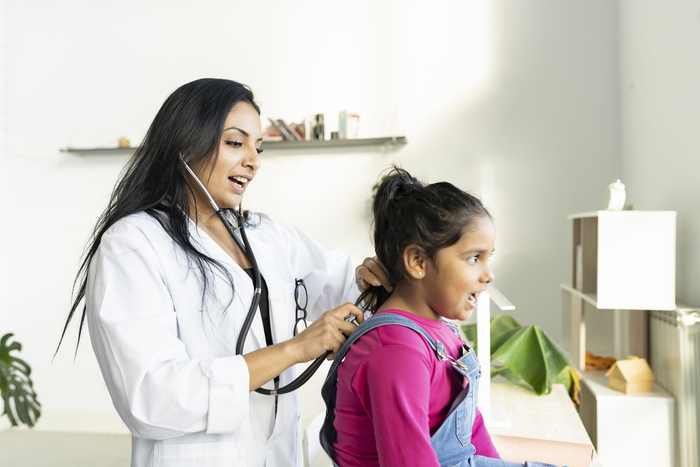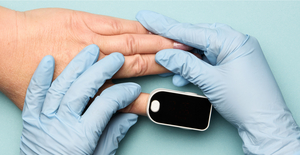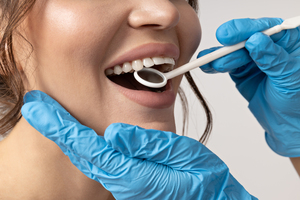Key points
- Annual health screenings play a crucial role in ensuring a child's physical and mental readiness for the school year, catching developmental concerns early, and updating vaccinations.
- Physical check-ups, vision and hearing tests, immunization checks, mental and behavioral health check-ins, and dental and oral health checks are essential parts of a child's back-to-school health prep.
- Regular physical exams, especially for children participating in sports, help ensure normal development and readiness for the school year.
- Urgent care clinics, pediatrician’s offices, and school or community health events are convenient places for getting your child’s back-to-school health screenings done.

As summer winds down and the school year approaches, back-to-school prep often focuses on new backpacks, sharpened pencils, and class schedules. But one of the most important steps you can take to set your child up for a successful year is making sure their health is in check. Annual health screenings aren’t just about checking a box—they play a crucial role in catching developmental concerns early, updating vaccinations, and ensuring your child is physically and mentally ready to learn.
From vision and hearing checks to routine physicals and immunizations, these screenings help schools maintain a safe environment and enable kids to stay focused, energized, and healthy. Whether your child is entering kindergarten or heading into high school, making time for a health checkup now can help prevent sick days and support their overall well-being throughout the year.
Important: Make sure to get your school and sports physicals completed 6 weeks prior to the start of school or the sports season to give enough time for specialist referals, if necessary.
1. Physical check-up, especially for those who want to play sports
An annual physical exam is a key part of the back-to-school checklist, especially if your child plans to participate in sports or physical activities. Many schools and athletic programs require an up-to-date physical before students can attend class, join a team, or participate in gym class. Even if it's not mandatory, a yearly checkup provides peace of mind that your child is developing normally and is ready to take on the demands of a new school year.
What’s included in a pediatric physical exam:
- Growth and development assessment to track milestones and identify any delays
- Vitals check including height, weight, and blood pressure
- Musculoskeletal screening to evaluate strength, flexibility, and injury risk for sports participation
- Discussion of chronic conditions or new health concerns, such as asthma, allergies, or mental health issues
Urgent care clinics are a convenient and efficient place to get your child’s physical exam, often with same-day appointments and flexible hours that fit around work and school schedules.
2. Vision screening
Clear vision plays a major role in your child’s academic success. From reading the whiteboard to focusing on books and digital screens, undetected vision problems can quickly lead to frustration, poor performance, or behavioral issues in the classroom. That’s why routine vision screenings are a vital part of your child’s back-to-school health prep.
What’s tested during a vision screening:
- Visual acuity (near and far) to assess how clearly your child sees at different distances
- Color vision and depth perception (depending on age and school requirements)
If your child frequently squints, rubs their eyes, complains of headaches, or has trouble focusing during reading or homework, it’s a good idea to schedule a full eye exam with an optometrist. Catching vision issues early can prevent learning delays and boost confidence in the classroom.
If your child already wears glasses, make sure they bring them to their physical so their vision can get checked with the glasses on.
3. Hearing test
Good hearing is essential for speech development, communication, and learning, especially in noisy classroom environments where kids need to follow directions and engage in group activities. Even mild or partial hearing loss can go unnoticed but still have a significant impact on a child’s ability to participate, stay focused, and keep up with their peers.
What to expect during a pediatric hearing test:
A pure tone screening will be used to assess how well your child hears different frequencies in each ear. Your child will wear headphones and be asked to respond when they hear a tone at various volumes.
If your child shows inconsistent responses or the results fall outside the normal hearing range, the provider may refer you to an audiologist for a more comprehensive evaluation. Prompt follow-up helps ensure that any underlying issues, such as ear infections, fluid buildup, or hearing loss, are addressed before they impact learning or development.
4. Immunization check
Vaccinations are a critical part of keeping your child—and their school community—healthy and protected from preventable diseases. These routine vaccines help prevent outbreaks of illnesses that can spread quickly in classrooms and school sports environments. Most schools require proof of up-to-date immunizations for enrollment, making it essential to check your child’s vaccine record before the school year begins.
Common required school vaccines include:
- DTaP (diphtheria, tetanus, and pertussis)
- MMR (measles, mumps, rubella)
- Polio
- Hepatitis B
- Varicella (chickenpox)
- Tdap and meningococcal vaccines for preteens and teens
Optional but recommended vaccines include:
- The annual flu shot to reduce the risk of seasonal influenza
- COVID-19 vaccine, recommended only for children with high-risk conditions; consult your doctor
- HPV vaccine, typically starting between the ages of 9 and 12 to protect against certain cancers
Urgent care clinics can often provide catch-up immunizations, helping you check this task off your list in one convenient visit.
5. Mental and behavioral health check-in
Back-to-school season isn’t just about physical health—your child’s emotional and mental well-being plays a huge role in how well they adjust, focus, and thrive in the classroom. Conditions like anxiety, ADHD, and social stress can affect attendance, academic performance, peer relationships, and even physical health.
Signs to bring up with a provider include:
- Withdrawal from activities or friends
- Sudden changes in mood or behavior
- Trouble sleeping or eating
- Difficulty concentrating or regulating emotions
Providers may use age-appropriate questionnaires for both parents and children to screen for emotional, behavioral, or developmental concerns. If something stands out, they can offer guidance, suggest next steps, or refer you to a mental health specialist for further support. Addressing these concerns early helps ensure your child feels confident, supported, and ready to succeed both academically and socially.
6. Dental and oral health check
Oral health is an essential—but often overlooked—part of a child’s overall wellness. Untreated cavities, gum issues, or tooth pain can lead to missed school days, trouble eating or speaking, and difficulty concentrating in class. By making dental care part of your back-to-school routine, you help your child start the year free of discomfort and ready to learn.
Dentists recommend that children have a checkup every six months. A visit before school starts is especially helpful for younger kids who are still developing good brushing and flossing habits.
What’s included in a dental checkup:
- Cavity screening to catch decay early
- Professional cleaning to remove plaque and tartar
- Fluoride treatment to strengthen enamel
- Sealants that can be applied to molars, if recommended, to prevent future decay
Where to get back-to-school health screenings
There are several convenient options for getting your child’s back-to-school health screenings done, depending on your schedule, needs, and access to care:
- A pediatrician’s office is the best choice for ongoing, personalized care. Your child’s doctor can track developmental milestones, manage chronic conditions, and maintain a complete medical history. It’s also a great setting to have broader conversations about nutrition, behavior, and mental health.
- Urgent care or walk-in clinics are ideal for busy families who need flexible, last-minute options. These clinics can handle sports and school physicals, administer required vaccines, and provide basic vision and hearing screenings—all without the long wait for a pediatrician appointment.
- School or community health events that many districts and local organizations host include free or low-cost health fairs before school starts. These events may offer immunizations, basic physical exams, and screenings for vision, hearing, or dental health. They can be a helpful resource for families seeking affordable care.
Get back-to-school ready—book a health screening today
Don’t let last-minute health to-dos delay your child’s school year. Use Solv to quickly find urgent care centers and clinics near you offering school physicals, required vaccines, vision and hearing checks, and more. With same-day and next-day appointments available, you can skip the long waits and check everything off your list—fast. Get your child ready to learn, play, and thrive this school year with a simple online booking through Solv.
FAQs
Why are annual health screenings important for children going back to school?
Annual health screenings are crucial for ensuring that a child is physically and mentally ready for the academic year. They help in catching developmental concerns early, updating vaccinations, and ensuring the child's overall well-being. This can help prevent sick days and support their overall well-being throughout the year.
What are the key health screenings that a child should have before going back to school?
The key health screenings include a physical check-up, vision screening, hearing test, immunization check, mental and behavioral health check-in, and a dental and oral health check. These screenings help ensure that the child is physically and mentally prepared for the school year and that they are up-to-date with their vaccinations.
What is included in a pediatric physical exam?
A pediatric physical exam includes a growth and development assessment to track milestones and identify any delays, a vitals check including height, weight, and blood pressure, a musculoskeletal screening to evaluate strength, flexibility, and injury risk for sports participation, and a discussion of chronic conditions or new health concerns, such as asthma, allergies, or mental health issues.
Why are vision screenings important for a child's academic success?
Vision screenings are vital as clear vision plays a major role in a child’s academic success. Undetected vision problems can lead to frustration, poor performance, or behavioral issues in the classroom. Catching vision issues early can prevent learning delays and boost confidence in the classroom.
What are the options for getting a child's back-to-school health screenings done?
There are several options for getting a child's back-to-school health screenings done. These include a pediatrician’s office for ongoing, personalized care, urgent care or walk-in clinics for flexible, last-minute options, and school or community health events that offer free or low-cost health fairs before school starts.









